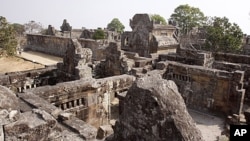Thailand on Sunday withdrew from the World Heritage Convention as Cambodia prepared to present management plans for a 900-year-old temple to a meeting of the committee in Paris. The Thai government says its withdrawal is meant to protect the country's sovereignty; analysts say it further delays implementing a management plan for the historical site.
Thailand’s withdrawal from the World Heritage Convention and the World Heritage Committee came during a Paris meeting after an agreement was reached to place a proposed management plan for the site on the meeting’s agenda.
Thailand has disputed moves by Cambodia to present a management plan for the 900-year-old disputed temple on the Cambodia-Thailand border.
At the meeting, Thailand requested a deferral of any proposed management plans until the the border dispute is settled. In 1962, the Hague-based International Court of Justice, or ICJ, ruled that the temple belonged to Cambodia. But the more than four-square-kilometer border around the temple, known as the Preah Vihear in Cambodia and Phra Viharn in Thailand, remains in dispute. In May, Cambodia called on the ICJ to force Thailand to withdraw troops from the contested territory surrounding the temple.
The Thai Natural Resource and Environment Minister, Suwit Khunkitti, announced Sunday's decision to withdraw from the World Heritage Convention.
Thai Government spokesman Panitan Wattanayagorn said the decision is aimed at protecting his country's national interests, given the territorial dispute.
“This is why the prime minister and the government of Thailand made a decision to withdraw from the treaty and the membership of World Heritage [Committee], just to make sure that we are not running any risks affecting our national integrity and sovereignty," he said.
In 2008, the temple was listed as a World Heritage site by the United Nations Educational and Scientific Organization, or UNESCO. Since then, Thailand and Cambodia have fought sporadically over the site.
In cross-border clashes in April, as many as 50,000 Thai and Cambodian villagers were forced to flee to emergency centers.
Political scientist Carl Thayer at the University of New South Wales in Australia calls the Thai government's decision to withdraw from the World Heritage Convention and Committee a step backward in ending the cross-border conflict over the Hindu temple.
“I suspect Cambodia will have to come up with a bit of a delay on their part," he said. "Bottom line - it would delay getting UNESCO to put the final seal of approval on it [i.e., the management plan] because the management plan is going through disputed territory. How does Cambodia effectively develop that temple? The stronger case would be if the two countries were going to cooperate.”
Angered by the government’s failure to take a tougher stance against Cambodia over the conflict, Thai nationalists welcomed their government’s withdrawal from the convention. In a protest last week in Bangkok, the nationalists demanded that the United Nations withdraw the temple's World Heritage designation.
Thai officials say they are prepared to work with the international community as well as with UNESCO and World Heritage members to move forward without the proposed management plan, they say, that affects Thailand's sovereignty.




